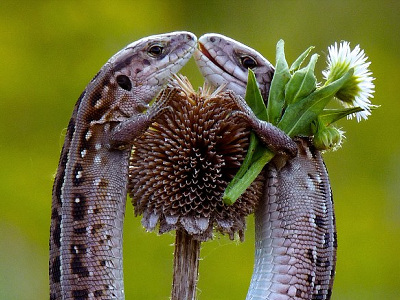Why are humans weak but less likely to be attacked by wild animals?

When walking in the mountains where wild animals such as bears live, it is often said that 'animals are afraid of humans, so if you appeal their existence, they will not be attacked.' However, humans are not so strong among animals, and it has been reported that they are often attacked by bears, crocodiles, and sometimes their dogs and die. Live Science, a scientific media, explains the question, 'Why is it difficult for wild animals to attack humans who have little chance of winning without weapons?'
Humans are practically defenseless. Why don't wild animals attack us more? | Live Science
Humans are animals that evolved from monkeys, and it seems that it is unavoidable for animals to recognize them as 'dressed monkeys,' but John Hawks , a paleoanthropologist at the University of Wisconsin-Madison, said. He points out that human 'bipedalism' poses a threat to wild animals. 'When you look at other primates such as chimpanzees and gorillas, they stand upright to represent the threat. Greater appearance is a threat, and a really easy way to tell carnivores that you're in danger.' That's it, 'Hawks said.
It is possible that humans have succeeded in making themselves look bigger by walking on two legs and threatening other species. However, bipedalism has the disadvantage that it is 'generally slower than quadrupedal animals, making it difficult to chase and conversely escape quadrupedal animals.' 'Bipedalism is like a bluff,' Hawks said, claiming that it's a kind of bluff that makes bipedalism make us look tougher than other species. ..

But even if wild animals see through human bluffs, there are other reasons why they wouldn't dare to attack humans. Hawks states that primates such as humans and chimpanzees have chosen to 'group' as a way to protect themselves from foreign enemies. In other words, the fact that humans are social animals helps protect humans from wild animals as well as bipedal walking. In addition, humans have advanced their technology to develop weapons such as bows and guns that can attack from a long distance, making it possible to fight and win wild animals with only weapons.

Another reason why humans are rarely attacked by wild animals is that 'the number of large predators that attack humans in the first place is decreasing.'
In the United States, the ' Law Concerning the Conservation of Endangered Species ' was enacted in 1973, but by then large predators and their habitats have suffered great losses. For example, wolves living in North America have been driven to the brink of extinction, and puma has been almost wiped out of the eastern United States except for parts of Florida.
Other predators whose habitat is close to humans face similar problems, and Surachi claims that animals that escaped the human threat have learned to be vigilant for humans. 'For very logical reasons, some large predators have a healthy fear of humans in the same way that predators fear predators,' Surachi said. I am.
Research team of Surachi et al's 2019 study , the California Santa Cruz Mountains passing a voice of Surachi Mr. and friends to speak poetry and books of verse in a gentle voice from the installation to the speakers in, the behavior of wild animals We analyzed the impact. As a result, it was found that although the human voice was not hostile, it had the effect of warding off predators such as puma from around the speaker. As a result, many smaller predators have become able to live.
Surachi believes that predators' fear of humans helps reduce conflicts between humans and predators. 'The fear of humans that predators show is a very positive light. This potentially gives predators and humans the opportunity to share space. Pumas and bears without any adverse effects. , You can go hiking where the wolf is, 'Srachi commented. LiveScience recommends that when walking in areas where predators are present, they should act in groups and speak out to promote their presence so that distant predators can escape first. did.

Related Posts:







